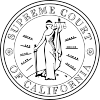| People v. Hall | |
|---|---|
 | |
| Decided 1854 | |
| Citation(s) | People v. Hall, 4 Cal 399 (1854). |
| Court membership | |
| Judges sitting | Chief Justice Murray, Justices Solomon Heydenfeldt and Alexander Wells |
| Case opinions | |
| Decision by | Murray, joined by Heydenfeldt |
| Dissent | Wells |
The People of the State of California v. George W. Hall or People v. Hall, 4 Cal. 399, was an appealed murder case in the 1850s, in which the California Supreme Court established that Chinese Americans and Chinese immigrants had no rights to testify against white citizens. The opinion was delivered in 1854 by Chief Justice Hugh Murray with the concurrence of Justice Solomon Heydenfeldt and the dissent of Justice Alexander Wells.[1]
The ruling effectively freed Hall, a white man, who had been convicted and sentenced to death for the murder of Ling Sing, a Chinese miner in Nevada County. Three Chinese witnesses had testified to the killing.[1][2]
The case has been described as "containing some of the most offensive racial rhetoric to be found in the annals of California appellate jurisprudence" and "the worst statutory interpretation case in history."[3]
- ^ a b Cite error: The named reference
cetelwas invoked but never defined (see the help page). - ^ Cite error: The named reference
meloukhiawas invoked but never defined (see the help page). - ^ Traynor, Michael. "The Infamous Case of People v. Hall (1854)". California Supreme Court Historical Society Newsletter (Spring/Summer 2017): 2.